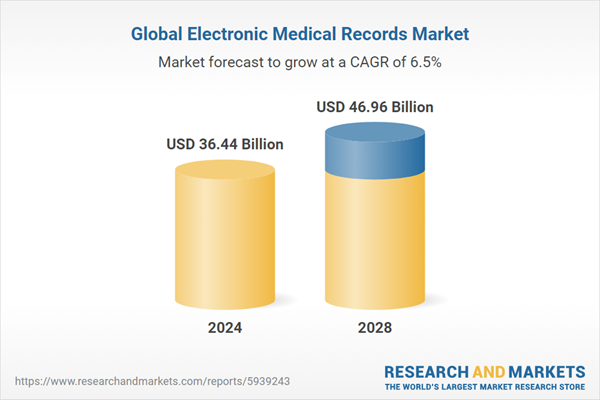Dublin, March 11, 2024 (GLOBE NEWSWIRE) -- The "Electronic Medical Records Global Market Report 2024" report has been added to ResearchAndMarkets.com's offering.
The electronic medical records market size is expected to see strong growth in the next few years. It will grow to $46.96 billion in 2028 at a compound annual growth rate (CAGR) of 6.5%. Forecasted growth is driven by healthcare IT expansion, government initiatives, digital transformation demand, and the lasting impact of COVID-19. Key trends include increased focus on AI, natural language processing, voice assistance tech, cloud-based EHR adoption, strategic partnerships, and heightened investments and M&A activities.

The expansion of healthcare information technology is playing a pivotal role in driving the growth of the electronic medical records (EMR) market within the healthcare sector. Electronic medical records, a key application in healthcare, are designed to be created, managed, and accessed by authorized personnel within a healthcare organization, facilitating the seamless provision of electronic healthcare services. The rapid adoption of electronic medical records necessitates ongoing development and the implementation of user-friendly applications, advancements achievable through the dynamic Information Technology (IT) sector in healthcare. A survey conducted by BMC Health Services Research, an open-access healthcare journal, revealed a commendable electronic health records adoption rate of 52.8%, underscoring the readiness of healthcare professionals for electronic medical records. Consequently, the growth in healthcare information technology is poised to be a significant driver for the expansion of the electronic medical records market in the healthcare industry.
The global rise in health-related ailments is expected to be a major catalyst propelling the growth of the electronic medical records market in the forecast period. The surge in health diseases can be attributed to factors such as climate changes, rapid urbanization, evolving land-use patterns, infections, heredity, and other determinants. The escalating prevalence of diseases is anticipated to result in a growing number of patients, driving the demand for efficient medical record-keeping, including the utilization of Electronic Medical Records (EMRs). As the volume of healthcare documents and information continues to increase, there is a growing need for effective tools for record management. Electronic medical records emerge as one of the most efficient solutions for storing, accessing, retrieving, and safeguarding patient health records, contributing to preventive care. According to the International Agency for Research on Cancer (IARC), a WHO-affiliated intergovernmental agency, the estimated number of new cancer cases is expected to reach 26 million, with projected annual cancer deaths reaching 17 million by 2030. Consequently, the escalating prevalence of health diseases is anticipated to drive the growth of the electronic medical records market.
The integration of artificial intelligence (AI) for predicting clinical outcomes based on Electronic Health Records (EHR) is a transformative force in shaping the electronic medical records market. AI, representing the computer's ability to perform tasks that typically require human intelligence and judgment, is harnessed within Electronic Medical Records (EMR) to analyze, present, and comprehend intricate medical and healthcare data in a manner mirroring human behavior. An illustrative example is the October 2021 launch of a Windows version of Suki Assistant by Suki, a USA-based AI-powered healthcare voice solutions company. Suki Assistant utilizes AI to listen to and understand spoken words by healthcare professionals, translating them into written form, thereby offering end-to-end voice-enabled clinical digital assistance.
The adoption of Natural Language Processing (NLP) stands out as a key trend in the electronic medical records market. NLP involves creating machines capable of understanding text or voice input and responding in a manner akin to human interaction through text or speech. In the realm of EHRs, NLP techniques are leveraged to capture unstructured data, analyze grammatical structures, ascertain meanings, and summarize data. Consequently, NLP approaches contribute to cost reduction while efficiently extracting extensive data analytics information. A noteworthy instance is the September 2022 introduction of an automated prior authorization solution by Edifecs, Inc., a US-based healthcare technology company. This technology seamlessly integrates with Electronic Health Records (EHRs), automating prior authorizations at the point of care. This innovative solution not only enhances member experiences but also leads to improved outcomes, ongoing compliance, and reduced administrative burdens. Edifecs' automated prior permission solution interacts with EHRs, providing instantaneous authorizations through the combined application of NLP and AI technologies.
For more information about this report visit https://www.researchandmarkets.com/r/ozg3sl
About ResearchAndMarkets.com
ResearchAndMarkets.com is the world's leading source for international market research reports and market data. We provide you with the latest data on international and regional markets, key industries, the top companies, new products and the latest trends.
Attachment
